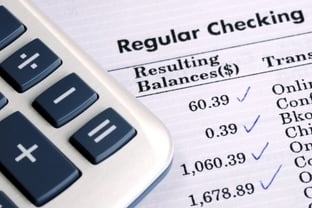 Lost in the shuffle of spam mail, coupons, and wrongly addressed envelopes is a document critical to your business—your bank statement. Failure to review your bank statement might seem a small oversight, but it could have drastic consequences. For example, a bank account holder’s claim against a bank for funds lost due to an employee embezzling funds from the account is generally governed by a one year period from the date that the bank sent the account statement containing the first act of fraud or embezzlement. However, your account agreement could include a provision shortening that period to as little as thirty days. If the employee misappropriating funds is the same employee reviewing your bank statements, you might not find out until it is too late to make a claim against the bank. Instead, your only recourse may be to attempt to recover from the employee who has likely spent all the embezzled funds.
Lost in the shuffle of spam mail, coupons, and wrongly addressed envelopes is a document critical to your business—your bank statement. Failure to review your bank statement might seem a small oversight, but it could have drastic consequences. For example, a bank account holder’s claim against a bank for funds lost due to an employee embezzling funds from the account is generally governed by a one year period from the date that the bank sent the account statement containing the first act of fraud or embezzlement. However, your account agreement could include a provision shortening that period to as little as thirty days. If the employee misappropriating funds is the same employee reviewing your bank statements, you might not find out until it is too late to make a claim against the bank. Instead, your only recourse may be to attempt to recover from the employee who has likely spent all the embezzled funds.
Depending on the nature of the conduct in question, claims for fraudulent transactions against the bank may be governed by Chapters 3, 4, or 4A of the Uniform Commercial Code, which govern negotiable instruments, items, and funds transfers respectively. Each of these chapters contain provisions limiting relief for the account holder if a timely claim is not asserted against the bank within a certain period. The period commences when the account holder should have known of the claim, even if the embezzling employee hides the fraud because the employer did not exercise “ordinary care” in handling its own accounts. Thus, it is critically important for business owners to structure their fraud detection systems appropriately. For instance, when the same person is responsible for cutting and signing checks, setting up automatic bill payments, or paying bills by funds transfer, as well as for reviewing the bank statements for any improper activity, fundamental controls are lacking.[1] It is not a defense that you did not actually know that the employee was hiding the statements because it is your duty to structure your business and implement security controls in a way to avoid such issues. Contrary to what one might hope, banks cannot know everything, and depend on their customers to review their statements to detect fraud.
For example, in Groue v. Capital One, 2010-0476 (La. App. 1 Cir. 9/10/10); 47 So.3d 1038, a court dismissed a bank customer’s claims against the bank because of his failure to properly manage his account. The bank customer had lost over $11,000 when a person living with him forged his name on his checks, but he would not discover this for over two months because the fraudster was hiding the bank statements. Id. at 1042. The customer’s claims against the bank were thus dismissed because “[e]arly detection…could have prevented the subsequent losses.” Id. Importantly, the court also noted that the customer’s contract with the bank included a 30-day notice provision. This provision required the customer to notify the bank of the altered or forged checks within 30 days of the bank statements being sent, or the bank would have no liability. Id. at 1043. This common provision in bank statements means that failing to review even one of your bank statements could preclude any future claims against your bank for fraudulent transactions on your account.
Courts around the country have similarly barred claims against banks when an account holder has failed to adequately review their bank statements, and the courts have almost unanimously held that the employee’s concealing of the fraud or embezzlement does not protect the employer.[2] Therefore, employers must ensure proper controls are in place to screen for fraudulent use of their company accounts to appropriately prevent an employee from taking advantage of the company coffers.
By Dominik J. Cvitanovic, commercial litigation attorney in the firm's New Orleans office and Stephen P. Scullin, partner of the firm and New Orleans business and corporate attorney.
[1] Credit Control Services, Inc. v. Greater Bay Hotel and Casino, Inc., No. 94-1471, 1994 WL 483454, *4 (E.D. Penn. Sept. 7, 1994); see also Jensen v. Essexbank, 396 Mass. 65 (1985) (holding that a “depositor is chargeable with the knowledge of all facts a reasonable and prudent examination of his bank statement would have disclosed if made by an honest employee”); K&K Manufacturing, Inc. v. Union Bank, 129 Ariz. 7, 10 (1981); Kiernan v. Union Bank, 55 Cal. App. 3d 111, 115 (Cal. App. 1976) (“The fact that the employee of a bank’s customer has concealed a forgery does not obviate the customer’s responsibility to examine his own bank statements.”).
[2] See footnote 1, supra.
For more Business & Corporate resources, check out:


